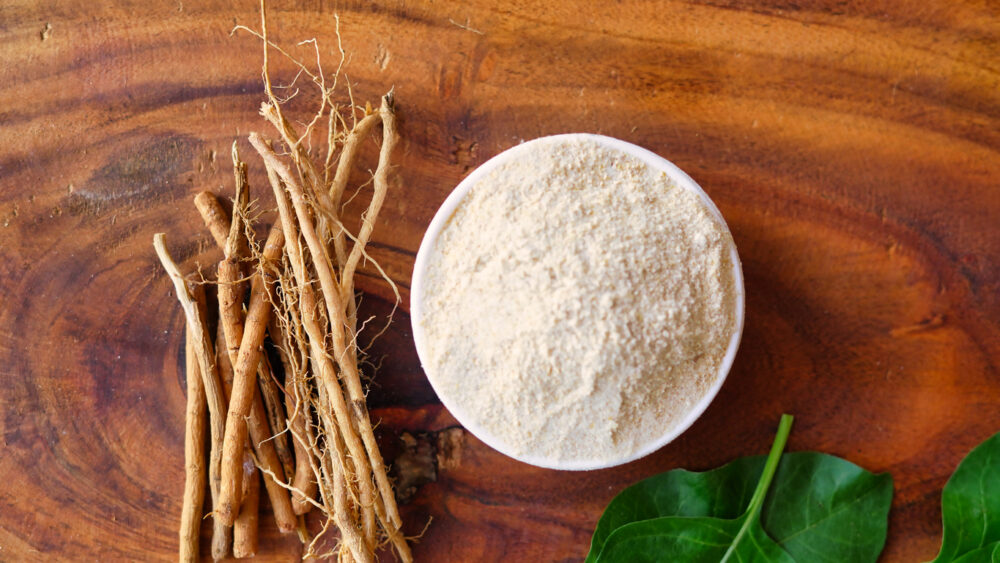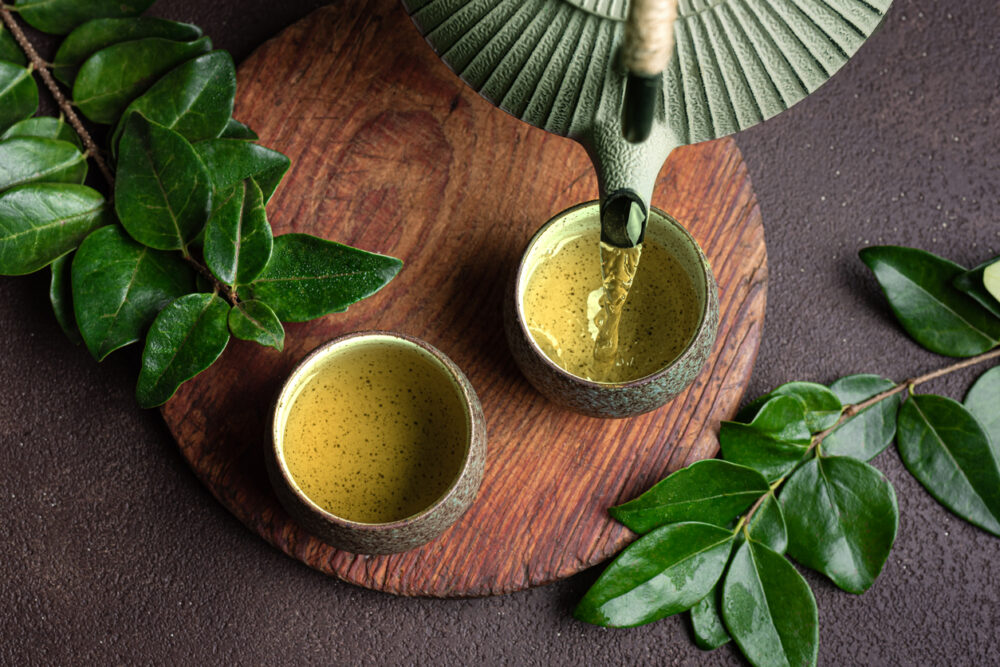Your nervous system isn’t craving another drink—it’s begging for real relief.

Reaching for a cocktail at the end of a hard day is practically a cultural reflex. Happy hour, wine o’clock, stress drinks—it’s all framed as self-care. But while alcohol might take the edge off in the moment, it rarely solves the problem. Over time, it can make anxiety worse, mess with your sleep, and leave your body running on fumes.
The good news is, alcohol isn’t the only way to calm your system. There are plenty of natural, science-backed tools that don’t require a pour or a bar tab. These alternatives help your body regulate from the inside out—lowering cortisol, balancing your mood, and giving your brain a break without the crash. Whether you’re looking to cut back, quit entirely, or just need a healthier go-to when stress hits, these 10 options offer serious relief with zero hangover.
1. Magnesium doesn’t just help you relax—it helps your brain chill out.

Cleveland Clinic explains that magnesium is essential for nervous system regulation, and low levels are linked to increased anxiety, poor sleep, and heightened stress responses. When levels dip, your brain can get stuck in overdrive. That’s when anxiety ramps up, your sleep gets weird, and your fuse gets shorter. Supplementing with magnesium—especially glycinate or threonate—can help smooth things out.
It supports GABA production, which is your brain’s natural calming chemical. Unlike alcohol, which messes with GABA in a way that creates dependency, magnesium helps restore balance without the rebound effect. Many people don’t realize how deficient they are until they start taking it and notice a real shift. It won’t sedate you, but it can take the edge off, especially at night. If your stress feels wired and restless, magnesium might be one of the simplest fixes you haven’t tried yet.
2. Adaptogens like ashwagandha train your body to handle stress better.

Adaptogens are herbs that help your body adapt—hence the name. Instead of forcing a sedative effect, they work behind the scenes to regulate your stress response. In a 2023 review, researchers Matteo Della Porta et al. found that ashwagandha can lower cortisol by up to 32%, making it one of the most effective herbs for easing stress and helping the body bounce back.
Think of it as stress conditioning for your system. You’re not masking symptoms; you’re strengthening how your body responds to pressure. Some people notice a shift in mood and energy within a week or two, while others experience a slow, steady buildup.
The key is consistency. Unlike alcohol, which hits fast and fades hard, adaptogens support long-term balance. Rhodiola and holy basil are other good ones to explore. If stress keeps knocking you flat, these herbs can help you stay standing without numbing out.
3. Breathwork sends a “stand down” message to your entire body.

When anxiety kicks in, your breathing usually changes without you noticing. It gets shallow, quick, and tight. That sends a signal to your brain that you’re in danger—even if you’re just stuck in traffic or doomscrolling your inbox. Breathwork flips that message completely.
Slowing your breath tells your nervous system that everything’s okay. Anna Gotter explains on Healthline that extending your exhale can help activate the parasympathetic nervous system, which shifts your body out of stress mode and into a state of calm. You don’t need an app, a mat, or a 30-minute session to make it work. One to two minutes of intentional breathing can bring your heart rate down and help you feel more grounded. It’s one of the fastest, free-est tools you can use—no side effects, no waiting.
4. Walking doesn’t just clear your head—it resets your stress hormones.

It sounds too simple to be effective, but walking is one of the most powerful ways to shift your mental state. Just 10 to 20 minutes of movement, especially outside, can lower cortisol, reduce anxiety, and improve your mood. It’s not about burning calories; it’s about recalibrating your entire system.
Rhythmic movement helps regulate your nervous system, especially when paired with daylight and a change of scenery. It gives your brain space to process, your body a chance to move tension through, and your emotions room to settle. You don’t need to power walk or track your steps. A slow loop around the block, phone down, eyes up—that’s enough. When everything feels tight and loud, getting your feet moving can help you come back into yourself without needing to escape entirely.
5. L-theanine takes the edge off without dulling your mind.

L-theanine is an amino acid found in green tea, and it works surprisingly well at calming you down without making you feel foggy. It promotes alpha brain waves—the same ones linked to relaxed, alert states like meditation. The result is a gentle calm that doesn’t interfere with focus.
It pairs especially well with caffeine if you’re someone who gets jittery from coffee but still wants the boost. Many people use it as a daily supplement to manage anxiety without sedatives or stimulants. It’s subtle but effective, especially during moments of tension or overstimulation. Unlike alcohol, it doesn’t override your system or knock you out; it supports a more functional calm. If your stress shows up as restlessness or racing thoughts, L-theanine is a solid alternative that works with your brain—not against it.
6. Cold exposure wakes up your body and shuts down anxious spirals.

Cold plunges and cold showers have gotten trendy for a reason. When done safely, exposing your body to cold triggers a reset in your nervous system. Your focus sharpens, your breathing deepens, and the noise in your head quiets down. Cold exposure increases norepinephrine, which helps boost mood and alertness. It also teaches your body how to stay calm under pressure—literally. You’re not avoiding stress; you’re training yourself to move through it.
Even a quick rinse at the end of your shower can leave you feeling clearer and calmer than you did before. It’s not always pleasant, but it’s incredibly effective. If you’re caught in looping thoughts or feeling stuck in a fog, a jolt of cold might be the fastest path out.
7. Journaling gets the chaos out of your head and onto the page.

Stress feels bigger when it stays bottled up. Writing things down doesn’t just help you organize your thoughts—it gives your brain a way to process what’s going on. You can be messy, angry, confused, or honest without needing to censor yourself. Journaling activates different parts of the brain than thinking or speaking. That separation alone can bring relief. It gives you distance from your emotions, which makes them easier to manage. Some people use prompts or gratitude lists; others just word-vomit onto the page.
There’s no wrong way to do it. Even five minutes can help you get unstuck and feel more grounded. You don’t need beautiful handwriting or deep insights. The goal isn’t to write something worth rereading—it’s to stop carrying everything in your head alone.
8. Weighted blankets work with your body’s natural need for pressure.

There’s something incredibly comforting about the feeling of gentle weight on your body. Weighted blankets take advantage of that instinct by providing deep pressure stimulation, which can lower heart rate, reduce anxiety, and help with sleep.
The science is rooted in how your nervous system responds to touch. That pressure helps switch your body into a calmer state by activating parasympathetic responses, similar to being hugged or swaddled. You don’t have to sleep under one all night to feel the benefits. Even using it for 10 to 15 minutes during a stressful moment can help your body shift gears. For people who feel physically restless or overwhelmed, weighted blankets offer real, physical grounding without needing to pop a pill or pour a drink.
9. Music can regulate your mood faster than you think.

Your nervous system responds to sound faster than it does to logic. A single track can lift you up, slow you down, or pull you out of a spiral—sometimes in under a minute. It’s one of the most underused tools for managing stress.
You don’t need a perfect playlist or special app. Just choose songs that match the state you want to move toward. If you’re anxious, something slow and instrumental can help. If you’re shut down or low-energy, try rhythm-heavy tracks that build gradually.
Music can regulate breathing, trigger emotional release, or simply distract your brain long enough to interrupt the cycle. Don’t underestimate how much your environment influences your state of mind. Sometimes, pressing play is the reset button you didn’t know you needed.
10. Connection with someone safe is stronger than any quick fix.

When stress gets overwhelming, your nervous system doesn’t always need a supplement or technique—it needs safety. A conversation with someone you trust can shift your entire mental state. You feel seen, heard, and supported, and that alone helps your body relax.
Humans are wired for co-regulation. That means our nervous systems literally sync up with the people around us. A calm voice, a shared laugh, or even a validating text can be more effective than anything in a bottle. If your first instinct is to isolate or “handle it yourself,” that’s often a sign you actually need the opposite. You don’t need a deep therapy session or a heart-to-heart. Just being around someone who makes you feel like yourself again can make all the difference.